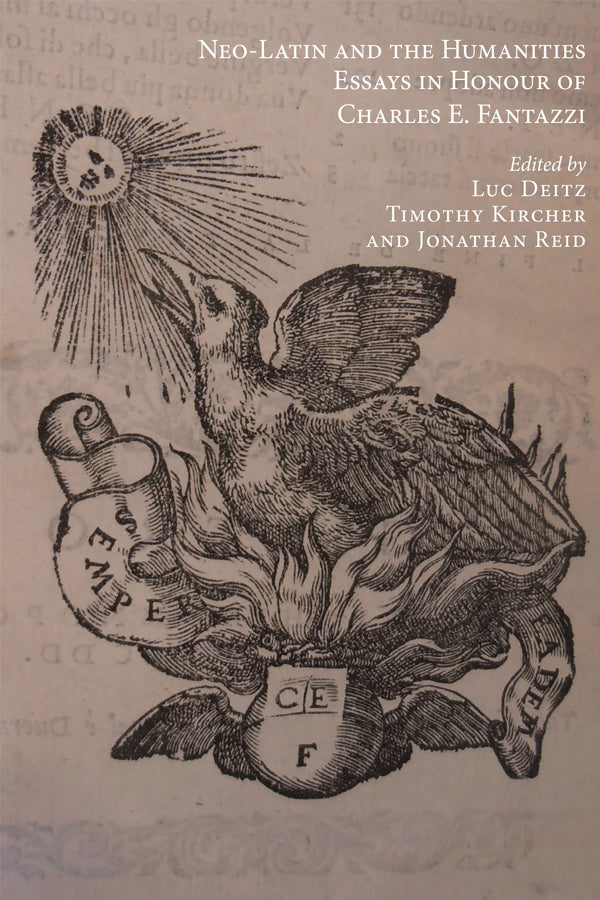Neo-Latin and the Humanities: Essays in Honour of Charles E. Fantazzi
Edited by Luc Deitz, Timothy Kircher, and Jonathan Reid - ES32
Overview
In their range and breadth, the essays in this collection illustrate the cultural force of Neo-Latin in Early Modern Europe. Neo-Latin was a vehicle for the translation of other languages; it united people across boundaries of ethnicity and nation; it carried with it the legacy of classical Latinity; it provided insight into religious doctrine; it shaped the development of early modern vernaculars; and, not least, it offered both style and substance to the evolving practice of Renaissance literary and textual criticism. To the degree that the humanities recognize their roots in the fifteenth-century studia humanitatis – the fields of grammar, rhetoric, history, poetry, and moral philosophy – they are also conscious of how these fields flourish in the domain of Latin culture.
Luc Deitz is Curator of Manuscripts and Rare Books at the Bibliothèque nationale de Luxembourg and Professor of Medieval and Renaissance Latin at the University of Trier (Germany).
Timothy Kircher is Professor of Medieval and Early Modern History at Guilford College.
Jonathan Reid is Associate Professor of Renaissance and Reformation History at East Carolina University.
289 pp.
ISBN: 978-0-7727-2158-7 softcover
Published: 2014
Contents
Timothy Kercher, "The Fruits of Neo-Latin Learning: An Introductory Note"
Luc Deitz, "Select Bibliography of the Works of Charles E. Fantazzi, 1965-2013"
Orientation
1. “Charles Fantazzi and the Study of Neo-Latin Literature”, James Hankins
New Roles for Latin in the Middle Ages and Early Renaissance
2. “The Rolls of the Dead and the Intellectual Revival of the Twelfth Century in Francia and Italy”, Ronald G. Witt
3. “Wrestling with Ulysses: Humanist Translations of Homeric Epic around 1440”, Timothy Kircher
Vives and Erasmus
4. “Colligite Fragmenta: A Neglected Tumulus for Joannes Ludovicus Vives (1492-1540)”, Jeanine De Landtsheer and Marcus De Schepper
5. “The Attitudes of the Jesuits toward Juan Luis Vives”, Paul F. Grendler
6. “The Englishing of Erasmus: The Genesis and Progress of the Correspondence Volumes of the Collected Works of Erasmus“, James M. Estes
Sixteenth-Century Humanism and Poetics
7. “Scholasticism, Humanism, and the Origins of the Collège de France”, James K. Farge
8. “Francesco Patrizi da Cherso on the Nature of Poetry”, Luc Deitz
9. “Euphonia and Energeia: Jan Bernaerts and Statius’s Thebaid“, Dustin Mengelkoch
Colonial and Neo-Latinity in New Spain and in Ireland
10. “A Humanist in the New World: Francisco Cervantes de Salazar (c. 1518-1575)”, Enrique González
11. "Laus Butleri: Praising the 10th Earl of Ormond in Irish, English, and Latin", Keith Sidwell
Epilogue
12. "In Praise of Charles Fantazzi", Luc Deitz
Praise
“This rich volume gathers essays of lasting significance that are original, profound, and written in remarkably accessible and lively prose. While some present original primary-source scholarship, others offer magisterial surveys of the current state of play in Neo-Latin Studies. Collectively, they make a compelling case for the vitality of the field and its abiding relevance to the humanities writ large.” – Kenneth Gouwens, University of Connecticut
“This volume is a fitting tribute to the scholarship of Charles Fantazzi. Its eleven excellent articles by renowned scholars in the field of Neo-Latin philology, Renaissance humanism, and the history of early modern learning are of extraordinary quality and break new ground in a variety of ways.” – Marc Layreys, Universität Bonn
Reviews
Erasmus Studies, 35 (2015), pp. 98-101. Reviewed by Craig Kallendorf.
H-Net Reviews, (May, 2015), pp. 1-2. Reviewed by Michael Martoccio
Seventeenth Century News, 73:3&4, (Fall 2015), pp. 211-213. Reviewed by Minna Skafte Jensen.
The Sixteenth Century Journal, 48:3, (Fall 2017), pp.773-775. Reviewed by Judith Rice Henderson.
Couldn't load pickup availability


